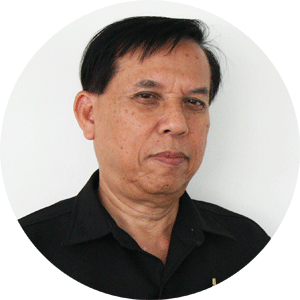
Writer: Rojana Manowalailao, ASEAN Sustainable Agrifood Systems
Chemical in agriculture is too often to be claimed of its fault effect on health, environment and climate change. To live harmoniously with the world of chemical when it is not yet avoidable, an alternative measure of responsible use of chemical, reduction and replacement is highly needed.
Public and private sectors who recently gathered at the 4th (Final) Drafting Meeting of National Action Plan (NAP) for Implementation of Biocontrol in Thailand in Bangkok talk about their roles and plans in promoting the use of biological products and making the world with less chemical.
 Ms. Rungrudee Jongseubsak, Assistant Manager, Chemical Registration of BASF
Ms. Rungrudee Jongseubsak, Assistant Manager, Chemical Registration of BASF
“Changing behavior cannot be done in a few days after attending a training or workshop. But, we still need it. To make farmers reduce the use of chemical pesticides and apply biocontrol crop protection products, they need to see what they will get from this change. Farmers will not get a fast result in controlling pests when they use biocontrol crop protection products and they may not be happy about it. But, it needs to be pointed out they will obtain better health, instead. This message needs to be highlighted and raised over and over in the training and workshop that promote the use of biocontrol agent products.
For BASF, although we are known as chemical company, we start to import some environmental friendly crop protection products to Thailand and we have just had two biological controls products registered in the country. We want to promote an integrated pest management (IPM) method for an appropriate and safe use of chemicals together with biocontrol products. And, we will do trainings for farmers to promote the IPM approach in Thailand. Farmers need to be aware of their actions and safety in the use chemical in agriculture.”
 Mr. Sarute Sudhi-aromna, Director of Pest Management Group, Department of Agriculture (DOA)
Mr. Sarute Sudhi-aromna, Director of Pest Management Group, Department of Agriculture (DOA)
“One challenge in promoting the use of biocontrol crop protection products in Thailand is we do not have a capacity to produce them in a large amount to meet demands of farmers. When we do pilot projects to encourage farmers to use these bio products and they seem to like the idea, we cannot provide ample supply to farmers after the pilot projects end.
Only Department of Agriculture Bangkok has a capacity to produce the bio products. The production involves facilities such as laboratory and equipment as well as human personnel and these require a large investment. So far, at DOA Bangkok we could make nine biocontrol crop protection products and we attempt to get the private companies for upscale production. However, there is a lost in transition.
Currently, we have a project to expand the production at DOA nationwide. There is a DOA office in each province and, ideally, each office should be able to produce the biocontrol products and distribute them to farmers. However, as it involves funds and personnel, we will see how far we can go. At DOA Bangkok, we also have limited resources. When we talk about knowledge and skill transfer, we also need to consider if we could manage to have enough people to provide training to all the offices nationwide, and whether the DOA offices in the provinces have their human resources ready and proper facilities and equipment invested.”
 Mr. Vinai Pitiyont, Consultant, Central Laboratory (Thailand) Co., Ltd.
Mr. Vinai Pitiyont, Consultant, Central Laboratory (Thailand) Co., Ltd.
“Producers of biocontrol products must have responsibilities to assure quality of their products. We at Central Lab do quality and standard check to see if the products are comply with the labels, for example, if they contain the plant extracts and active ingredient as listed, or whether their standard meets with the international recognized standard of FAO [Food and Agriculture Organisation of the United Nations].
This is voluntary as we are a third party agency and the cost will be at their expenses. However, this will help reassure standard. Also, the producers do not have to worry when the products displayed on a market shelf will being randomly selected for testing by the Department of Agriculture or some public and private agencies. It is a voluntary but shows a sense of duty and responsibility to themselves and their customers who are farmers.”
 Dr. Payorm Cobelli, Agricultural Research Officer, Senior Professional Level, Rice Department of Thailand
Dr. Payorm Cobelli, Agricultural Research Officer, Senior Professional Level, Rice Department of Thailand
“Brown Plant Hopper is a major insect pest in agriculture. And, using chemical has not been proved effective as it has created more pest resistance. However, in Thailand we do not have the biocontrol crop protection product registered for the Brown Plant Hopper. We need to develop the locally made one so that we can recommend it to farmers for their alternative use. And, also since it is the local made, it will have better efficacy for crop protection and better suits the local context.
At Rice Department we have been doing researches on production technology for biological control of the Brown Plant Hopper in order to support and promote the use of biocontrol in the country.”
The 4th (Final) Drafting Meeting of National Action Plan (NAP) for Implementation of Biocontrol in Thailand was organised at Department of Agriculture in Bangkok on 7 November 2016. The objective was to finalise the final draft of NAP paper and discuss the monitoring measure. Over 30 participants from both public and private sectors in Thailand attended the meeting.